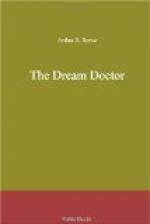Those who gathered that night, sitting expectantly in the little armchairs which Kennedy’s students used during his lectures, included nearly every one who could cast any light on what had happened at the Novella. Professor and Madame Millefleur were brought up from the house of detention, to which both O’Connor and Dr. Leslie had insisted that they be sent. Millefleur was still bewailing the fate of the Novella, and Madame had begun to show evidences of lack of the constant beautification which she was always preaching as of the utmost importance to her patrons. Agnes was so far recovered as to be able to be present, though I noticed that she avoided the Millefleurs and sat as far from them as possible.
Burke Collins and Mrs. Collins arrived together. I had expected that there would be an icy coolness if not positive enmity between them. They were not exactly cordial, though somehow I seemed to feel that now that the cause of estrangement was removed a tactful mutual friend might have brought about a reconciliation. Hugh Dayton swaggered in, his nervousness gone or at least controlled. I passed behind him once, and the odour that smote my olfactory sense told me too plainly that he had fortified himself with a stimulant on his way from the apartment to the laboratory. Of course O’Connor and Dr. Leslie were there, though in the background.
It was a silent gathering, and Kennedy did not attempt to relieve the tension even by small talk as he wrapped the forearms of each of us with cloths steeped in a solution of salt. Upon these cloths he placed little plates of German silver to which were attached wires which led back of a screen. At last he was ready to begin.
“The long history of science,” he began as he emerged from behind the screen, “is filled with instances of phenomena, noted at first only for their beauty or mystery, which have been later proved to be of great practical value to mankind. A new example is the striking phenomenon of luminescence. Phosphorus, discovered centuries ago, was first merely a curiosity. Now it is used for many practical things, and one of the latest uses is as a medicine. It is a constituent of the body, and many doctors believe that the lack of it causes, and that its presence will cure, many ills. But it is a virulent and toxic drug, and no physician except one who knows his business thoroughly should presume to handle it. Whoever made a practice of using it at the Novella did not know his business, or he would have used it in pills instead of in the nauseous liquid. It is not with phosphorised ether as a medicine that we have to deal in this case. It is with the stuff as a poison, a poison administered by a demon.”
Craig shot the word out so that it had its full effect on his little audience. Then he paused, lowered his voice, and resumed on a new subject.




